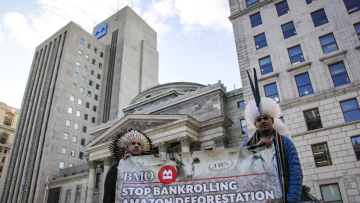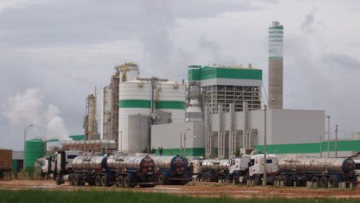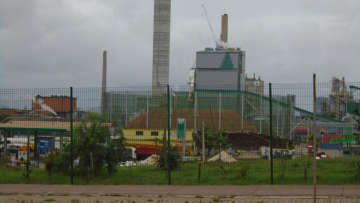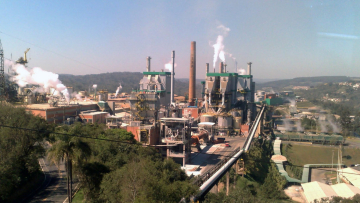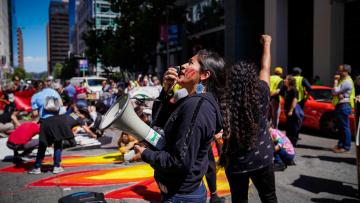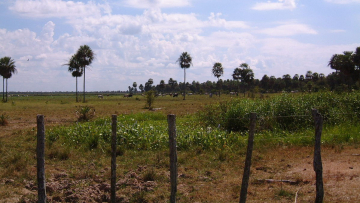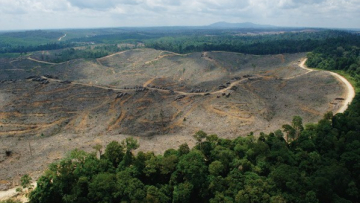Major banks fueling biodiversity collapse by $395 billion since the Paris Agreement; Governments failing to reign in banks
Ola Janus, Banks and Nature Campaign Lead, BankTrack

Ola Janus, Banks and Nature Campaign Lead, BankTrack
As the critical Convention on Biological Diversity (CBD) COP16 approaches, new research and analysis released today by the Forests and Finance Coalition –– a group of 10 international civil society organizations including Rainforest Action Network, TuK Indonesia, Profundo, Amazon Watch, Repórter Brasil, BankTrack, Sahabat Alam Malaysia, Friends of the Earth US, Milieudefensie & CED Cameroon –– reveals that the world’s major banks have funnelled over US$ 395 billion in credit to sectors driving deforestation and human rights abuses in tropical forests, since the adoption of the Paris Agreement, with US$ 77 billion in credit in the most recent analysis period alone (January 2023 to June 2024). Further analysis also exposes that the world’s governments are doing little to stem the tide, despite adopting the Global Biodiversity Framework (GBF) nearly two years ago. The research underscores the urgent need for robust regulatory measures to align financial practices with global biodiversity goals.
“Governments are asleep at the wheel while the world’s banks continue to fund forest destruction and human rights abuses, without any restriction or consequence,“ said Tom Picken, Director of the Forests & Finance campaign with Rainforest Action Network (RAN). “With the CBD COP16 upon us, the time for transformative action is now. The real ‘finance gap’ for conservation is actually a gap in regulation to stop banks and investors knowingly fuelling the biodiversity crisis.”
The second annual Banking on Biodiversity Collapse report is the most comprehensive analysis of global finance’s role in furthering tropical forest destruction. The report examines the banks and investors providing financing to 300 companies operating in six forest-risk commodity sectors –– beef, palm oil, pulp and paper, rubber, soy, and timber –– responsible for most of the tropical deforestation, biodiversity loss, and human rights abuses in Southeast Asia, Latin America, and Central and West Africa.
Released concurrently with a second report titled, Regulating Finance for Biodiversity, the two reports together show that the majority of financing is coming from Brazil, China, Indonesia, the EU, and the US and that strengthening financial regulations in these five countries and regions would have a critical impact on the problem. What’s more, governmental regulations are needed as voluntary banking initiatives are proving to be a failure, with over half of the top 30 forest-risk banks being members of at least one sustainability initiative, such as the Principles for Responsible Banking, the Net-Zero Banking Alliance, and the Taskforce on Nature-related Financial Disclosures (TNFD).
Worryingly, the TNFD is promoting itself at CBD COP16 as a solution to the biodiversity crisis, yet it is incompatible with the GBF 2030 targets. The TNFD allows companies to pick and choose what biodiversity aspects they report on and has been developed by some of the very businesses that drive ecological destruction.
“Almost half of the 40 corporations that make up the TNFD decision-making body are linked to serious environmental and human rights concerns, including several companies that face complaints under OECD mechanisms, are the subject of legal cases, are on investor exclusion lists or have paid out millions related to environmental violations,” said Danielle van Oijen, Forest Program Coordinator at Milieudefensie. “TNFD's corporate capture of the CBD needs to stop here with all references to TNFD removed from the texts.”
As drought-fueled forest fires rage in the Amazon rainforest during one of the worst fire seasons on record, the Banking on Biodiversity Collapse report details how JBS, the world's largest meat processing company, has fueled the devastation of Indigenous lands in the Amazon, supported by US$ 1.1 billion in credit from major financial institutions. Despite commitments to ethical practices, JBS continues perpetuating deforestation and human rights violations.
Instead of being held accountable, companies like JBS –– responsible for destroying forests and violating human rights –– are rewarded with millions in financing.
“The governance of commodity supply chains is still very fragile. Without changes, rights violations and the destruction of biomes will continue to occur," said Marcel Gomes, Executive Secretary at Repórter Brasil.
“Despite participating in numerous voluntary banking initiatives on nature and biodiversity, commercial banks continue to finance companies that actively destroy life on Earth. Voluntary initiatives will not drive the transformative changes needed to halt and reverse biodiversity loss by 2030 –– we need regulation that mandates banks to stop financing deforestation” said Ola Janus, Banks and Nature Campaign Lead at BankTrack.
“Policymakers must enforce stricter financial regulations that ensure financial flows and investments do not contribute to environmental degradation and human rights abuses, and instead undertake a just transition towards sustainable, community-led solutions that protect ecosystems and promote equitable development,” said Jeff Conant, Senior International Forest Program Manager at Friends of the Earth U.S.

